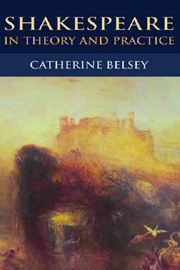Book contents
- Frontmatter
- Contents
- Preface
- 1 Introduction: Practising with Theory
- 2 Psychoanalysis and Early Modern Culture: Lacan with Augustine and Montaigne
- 3 Love as Trompe-l'oeil: Taxonomies of Desire in Venus and Adonis
- 4 Tarquin Dispossessed: Expropriation and Consent in The Rape of Lucrece
- 5 Antinomies of Desire and the Sonnets
- 6 Peter Quince's Ballad: Memory, Psychoanalysis, History and A Midsummer Night's Dream
- 7 The Illusion of Empire: Elizabethan Expansionism and Shakespeare's Second Tetralogy
- 8 Making Histories Then and Now: Shakespeare from Richard II to Henry V
- 9 The Case of Hamlet's Conscience
- 10 Iago the Essayist
- Notes
- Index
10 - Iago the Essayist
Published online by Cambridge University Press: 12 September 2012
- Frontmatter
- Contents
- Preface
- 1 Introduction: Practising with Theory
- 2 Psychoanalysis and Early Modern Culture: Lacan with Augustine and Montaigne
- 3 Love as Trompe-l'oeil: Taxonomies of Desire in Venus and Adonis
- 4 Tarquin Dispossessed: Expropriation and Consent in The Rape of Lucrece
- 5 Antinomies of Desire and the Sonnets
- 6 Peter Quince's Ballad: Memory, Psychoanalysis, History and A Midsummer Night's Dream
- 7 The Illusion of Empire: Elizabethan Expansionism and Shakespeare's Second Tetralogy
- 8 Making Histories Then and Now: Shakespeare from Richard II to Henry V
- 9 The Case of Hamlet's Conscience
- 10 Iago the Essayist
- Notes
- Index
Summary
Like it or not, the racist Iago has style. Succinct, laconic, dispassionate, Iago's speech is blunt and to the purpose, prosaic even where it is lineated like verse. His manner is generally minimalist, understated, cool and ironic. When it comes to money, for example, he is casually aphoristic: ‘Who steals my purse steals trash’ (3.3.160); on the determinations of personal disposition, he is terse and iconoclastic: ‘Virtue? a fig! 'tis in ourselves that we are thus, or thus’ (1.3.320–1); towards Cassio, he is wittily contemptuous: ‘Mere prattle without practice / Is all his soldiership’ (1.1.25–6); and on Othello, dismissive: he ‘will as tenderly be led by th' nose / As asses are’ (1.3.400–1).
The implications of Othello's blackness have rightly formed the central theme of most commentary for the last forty years. Here, for the sake of variety, I approach the play experimentally from a formal perspective to assess the part played by Iago's mode of address in this tragedy of racial hatred. Most evidently, his dry, low-key style stands in direct contrast to the passionate poetry that defines the hero. From Othello's first entrance, with ‘Keep up your bright swords, for the dew will rust them’ (1.2.59), to his first despair (‘Farewell the plumed troops and the big wars’ (3.3.352)), the protagonist's speech is grand, intense, adjectival, frequently periodic, normally metrical and, in a word, heroic. Othello the soldier is also in love, and if this passion is ultimately simple because unqualified – as simple as Iago's misanthropy and much more absolute – Othello's idealising love is simultaneously immense: ‘when I love thee not / Chaos is come again’ (3.3.91–2).
- Type
- Chapter
- Information
- Shakespeare in Theory and Practice , pp. 157 - 171Publisher: Edinburgh University PressPrint publication year: 2008



